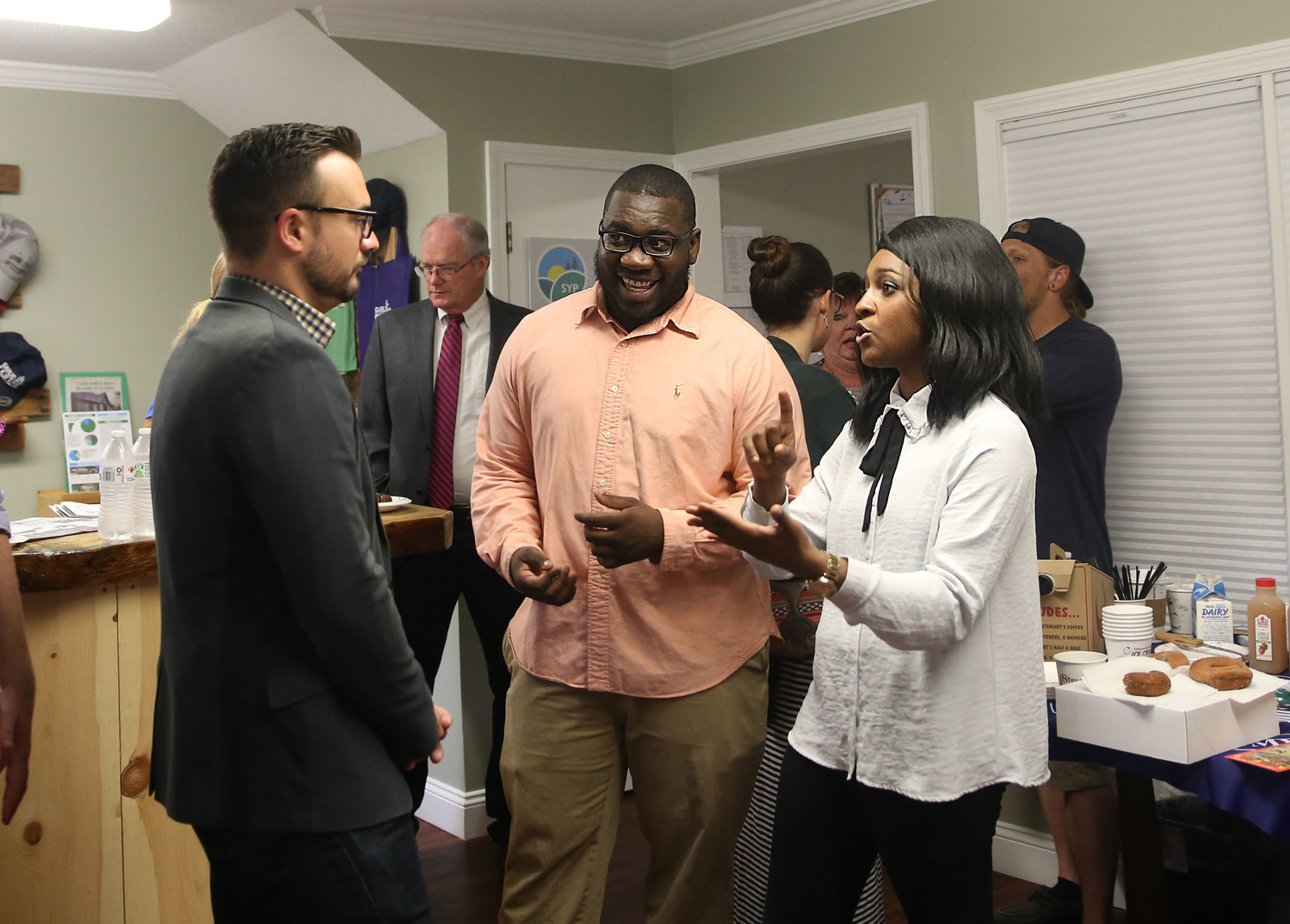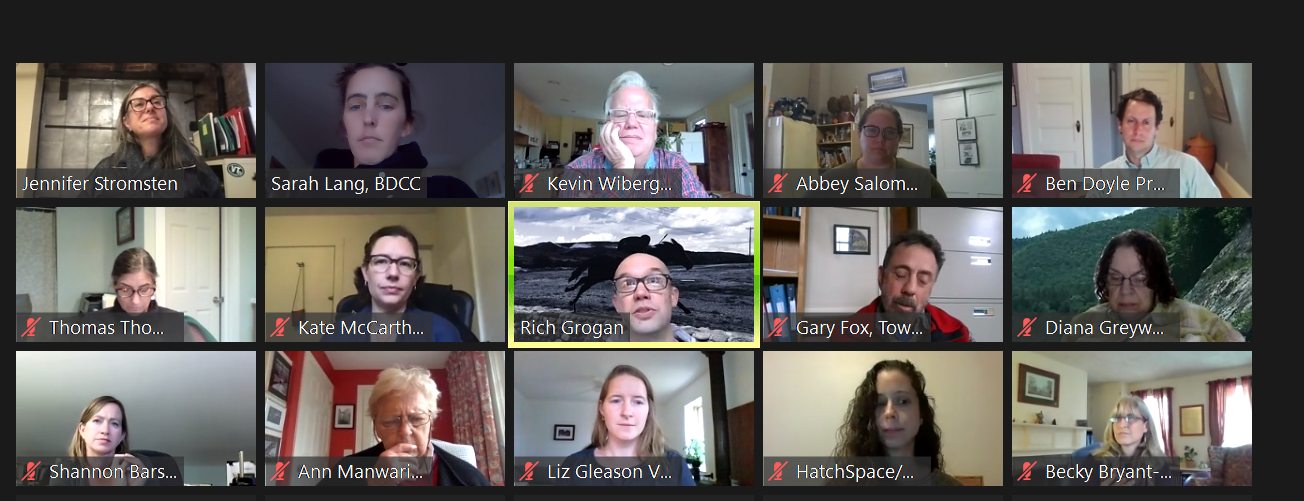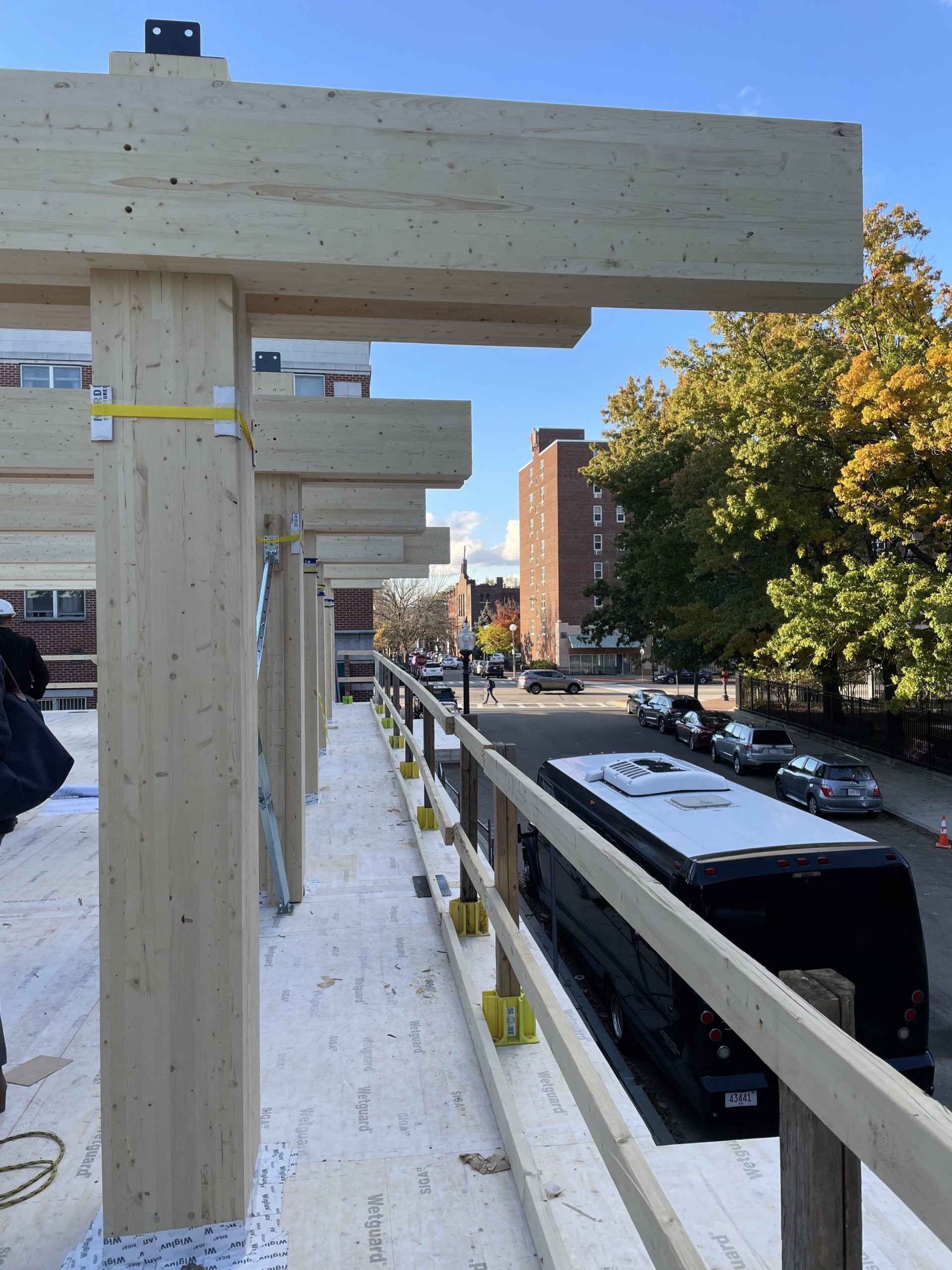
Making the Impossible Possible at Former Neenah Paper Mill
From the Brattleboro Reformer. For more photos and the original article visit the Reformer.com
By Bob Audette, Brattleboro Reformer
BRATTLEBORO — A little more than two months ago, a meeting of the minds was called to figure out a way to keep a paper mill in operation.
On Oct. 25, Neenah, the Georgia-based company that bought the formerly named Fibermark in 2015, announced it was shuttering the plant, which would result in the loss of more than 100 good-paying jobs in the Brattleboro area.
“When we got the notice that they were going to close the plant, we rang up Neenah and said we need to chat,” said Adam Grinold, the executive director of the Brattleboro Development Credit Corporation. “Our intention for reaching out was we wanted to help them maintain the plant, that we didn’t want to see it close. These jobs are too important.”
The BDCC is a private, non-profit economic development organization, one of 12 regional development corporations around Vermont that functions as “one-stop-shops” for businesses and entrepreneurs seeking access to business support services. The RDCs either provide these services directly, or serve as the conduit to connect businesses to the needed services.
In the case of the BDCC, it directly supported the purchase of the Neenah paper mill by a group of four investors and connected the group with services available at the local, state and federal level.
“Neenah said ‘No,'” said Grinold. “They said the closure is real and that we could give them all the assistance we had available but they are closing the plant. They said ‘The only thing you can do is find a buyer who can close by Dec. 31.'”
An impossible task?
It seemed like an impossible task, but word had been percolating in the industry and within the United Steel Workers, which represents paper mill employees around the country, that Ben Rankin and his partners, Phil Farmer, Mike Cammenga and Richard Normandin — going by the name Long Falls Paperboard — were in the market for a paper plant.
Most recently, they had been eyeing the Carthage Specialty Paperboard in West Carthage, N.Y. When that deal fell through, Rankin and Farmer began to cast about, particularly in the Northeast, for other opportunities.
That’s when they heard about Neenah’s plan to close its plant in Brattleboro.
“We had worked hard with the union on the Carthage mill,” said Rankin. “We had built some trust and good relations and they didn’t hesitate to send us this way. I believe the union also rattled the cage a bit so that Neenah knew we were really serious and capable.”
Rankin and Farmer quickly arranged a trip to Brattleboro and reached out to Grinold and his staff at the BDCC. On Oct. 30, the BDCC facilitated a meeting between state agencies and Rankin and Farmer, a meeting of the minds that was meant to bypass the normal bureaucratic red tape that stood in the way of a purchase agreement being reached before Dec. 31.
“We sat in this room 62 days ago,” ankin said on Wednesday in the conference room at the now re-named Long Falls Paperboard paper mill. “And now, here we are, the owners of this plant.”
“Everyone rallied to the cause,” said Grinold, with representatives from a number of state agencies meeting with the BDCC and Long Falls to figure out a path forward.
“Our partners in the town, the state and the Department of Environmental Conservation organized nine different permitting entities, knowing that a delay was unacceptable, said Grinold. “There were people burning both ends of the candle to get this done. They did it not for their own self interest, but because of the importance of possibly losing 100 jobs. We are still digging out from the loss of 600 high-paying jobs at Vermont Yankee [nuclear power plant in Vernon]. Every job counts.”
“Adam and the entire BDCC team dropped everything and responded to support the potential acquisition by Long Falls Paperboard and save the threatened jobs,” said Peter Elwell, Brattleboro Town Manager. As the regional development corporation, BDCC is experienced and effective in guiding businesses through coordination with the State of Vermont and the Town of Brattleboro as they consider making their investment in our community.”
A unique partnership
The BDCC and Long Falls created a public-private partnership that included BDCC’s purchase of the building and the property site for $1 million from Neenah. The short-term plan is for Long Falls to purchase the building and the property from the BDCC within the next year.
“After understanding the timeline, needs and importance of this project I determined that two outcomes were necessary,” said Trish Coppolino, an environmental program manager with the Vermont Department of Environmental Conservation. “DEC needed to ensure that BDCC was comfortable with their liability related to owning the property and the resources available to assist them with any environmental sampling that would be required.”
In order to deal with the cleanup of any contamination issues at the plant, BDCC, as part of its purchase agreement, will hold the real estate assets while cleanup is underway.
“As a state-recognized regional development corporation, BDCC is able to avail itself of a state program that allows an RDC to take title to property without incurring continuing environmental liability,” said Brett Long, deputy commissioner of the Vermont Department of Economic Development. While the BDCC leases the property to Long Falls, it will undertake the cleanup, which Long characterized as “relatively minor.”
The BDCC and Long Falls received support from Brattleboro Planning Director Sue Fillion and Assistant Town Manager Patrick Moreland to find available resources for brownfields assessment and cleanup of the site.
Cleanup facilitates continued operation
Rankin said compared to other, older paper mills around the country, there is very little contamination at the Brattleboro site. But Rankin said it was important for him and his partners to get started with a clean site and not have to worry about what was underfoot and how they were going to pay for any remediation.
“There are some old storage tanks and a little asbestos in a few places in the building, but nothing that immediately impedes operations,” he said.
But taking over the uninterrupted operation of the plant requires a massive influx of capital, just to keep the machines working and the paychecks coming, said Rankin. Coming up with another million dollars or more for cleanup might have limited the ability of the partnership to purchase the facility.
“Frankly, we have a lot of demands on capital,” said Rankin. “There are good machines here but we are going to have to spend a million a year on a sustaining basis and to gradually improve the plant’s capabilities. Having a nice clean site that we can acquire with great confidence is what makes us feel good about the long-term future.”
“This was a great opportunity to ensure that DEC requirements were clearly presented and to allow technical staff and the folks from Long Falls to ask questions about current and future processes at the facility,” said Coppolino.
Coppolino said everyone in DEC from Commissioner Emily Boedecker, to the directors within DEC to staff members on the ground understood how important it was to get everything done within the limited window available due to the Dec. 31 closing date.
BDCC untangles the red tap
In addition to support for the cleanup of the site, Long Falls also needed assistance in obtaining financing for the project, work-force incentives and operational support. Identifying all of the resources would not have been practical without a partner such as BDCC to open doors for Long Falls, said Rankin.
“BDCC has the expertise, the staff and the ability to get it done,” said Rankin. “Having BDCC involved made this a possibility for us. We want to be here for a long time.”
“Time and again we hear from business leaders how much they appreciate the accessibility of state and town officials and the nimble way in which the state, BDCC, and the town work together in such situations,” said Elwell.
BDCC Board President Bob Stevens believes the partnership between the BDCC, Long Falls, the state and the town can be a winning model for local economic development partnerships.
“This transaction is a huge win for the region, and we are pleased to have nimble public, private, local, and statewide partners who understand our region’s continued vulnerability from the lost wages following the closure of Vermont Yankee and that they made it a priority to help this deal come together quickly,” said Stevens.
“LFP’s business plan indicates that it will work with the plant’s current employees, make investments to significantly improved productivity and reduce operating costs and seize market opportunities in packaging and other paper products to expand sales and production at the Brattleboro plant,” said Jo Bradley, executive director of the Vermont Economic Development Authority. “Management expects to make further improvements in the plant to improve energy efficiency and productivity over the next several years to help create a thriving paperboard manufacturing business in Brattleboro serving customers across the country, in Canada and overseas.”
Efficiency Vermont and GMP chip in
Long Falls received additional support from Efficiency Vermont in the form of a grant to fund upgrades to existing boilers.
“It was fortuitous that just last March, Efficiency Vermont had engaged with the previous owner to perform an intensive assessment of the energy efficiency opportunities at the facility,” said Efficiency Vermont Director Rebecca Foster. “Because of that work, which wouldn’t have been possible without help from the plant’s staff, Efficiency Vermont was able to act very quickly to provide Long Falls Paperboard with a robust assessment of the plant’s energy savings potential and offer incentives to help them lower the cost of investing in energy efficiency upgrades.”
Efficiency Vermont collaborated with Green Mountain Power to help Long Falls reduce its dependence on fossil fuels.
“Efficiency Vermont and Green Mountain Power are offering Long Falls Paperboard incentives to make energy upgrades that will save the plant millions of dollars in energy costs over time, helping them to be more competitive in the market,” said Foster. “This was an example of partnership at its best; when we share a goal and combine resources in a way that makes everyone more effective than they could be on their own,”
Long Falls qualified for GMP’s Economic Development Incentive Program, which discounts the facility’s energy costs by 20 percent in the first four years and 10 percent in the the fifth year. The program is only available to companies that are bringing or keeping jobs in the Green Mountain State.
“We’re proud to be a part of this great team Vermont effort to create good-paying jobs for Vermonters,” said Green Mountain Power President and CEO Mary Powell. “Green Mountain Power is focused on helping cut carbon and costs for the customers we serve.”
Paper vs. paperboard
“We’re very pleased to have been able to work with the Long Falls Paperboard team on the sale of the Brattleboro mill to them and ensure continued employment for the workforce,” said Bill McCarthy, vice president of financial analysis and investor relations at Neenah. “Both sides, along with help from employees at Brattleboro, worked closely together to meet tight deadlines and complete the sale by year end. We appreciate the cooperation from state and local officials, and wish Long Falls much success with their new operation.”
Rankin said working with Neenah was a pleasant surprise, considering how cut-throat the competition can be in the marketplace for paper products.
“They could have taken an easier road,” said Rankin. “Neenah was committed to keeping this facility open, which is fairly unusual. Many paper companies will make a point when they are closing a mill that they want to scrap it and sell off the pieces because they don’t want the competition. They would rather take the capacity out of the market. Neenah really did right by the community and they deserve credit.”
Rankin said when Neenah bought Fibermark, the Brattleboro facility was just one of the assets it acquired.
“The reality is, Neenah is a paper maker, not a paperboard maker,” he said. “This mill was a little bit outside of their area of expertise and where they wanted to put their focus. They found the Brattleboro plant was not a good fit for them.”
According to the American Forest & Paper Association, paperboard differs from paper in that it is a heavier grade, specially designed for applications such as packaging, binders, book and magazine covers and postcards.
“There are a lot of different niche markets for paperboard,” said Rankin. “Any mill has to decide what its equipment is best suited for and what its market is going to be.”
Rankin said he and his partners are already busy seeking out new customers and the mill is running some test products for at least one potential client.
The most valuable asset
Rankin said the assistance of the BDCC and its ability to quickly bring all the stakeholders to the table is only part of the story. Even with a relatively new facility with state-of-the-art paper machines, the investment would be a waste if not for the human capital already in place at the plant.
“The fact that there was an experienced team here that has a nice broad skill set was really important,” said Rankin. “They have been working really hard and it was reassuring to know that there are people here who are really committed to the plant.”
“Everyone here is excited, energized and dedicated to the process and the necessary work to make Long Falls successful,” said Farmer, who has been working one-on-one with the more than 100 employees in the facility.
“The employees will have full access to the the financial balance sheets and the capital plans so everyone knows what we are doing and can participate in moving the business forward,” said Farmer. “Our belief is we keep them fully aware of what’s going on, we develop them with the skills and give them the resources, clarity of purpose and they will naturally focus on their role. They are invested and they are making it happen.”
Bob Audette can be contacted at 802-254-2311, ext. 151, or raudette@reformer.com.



